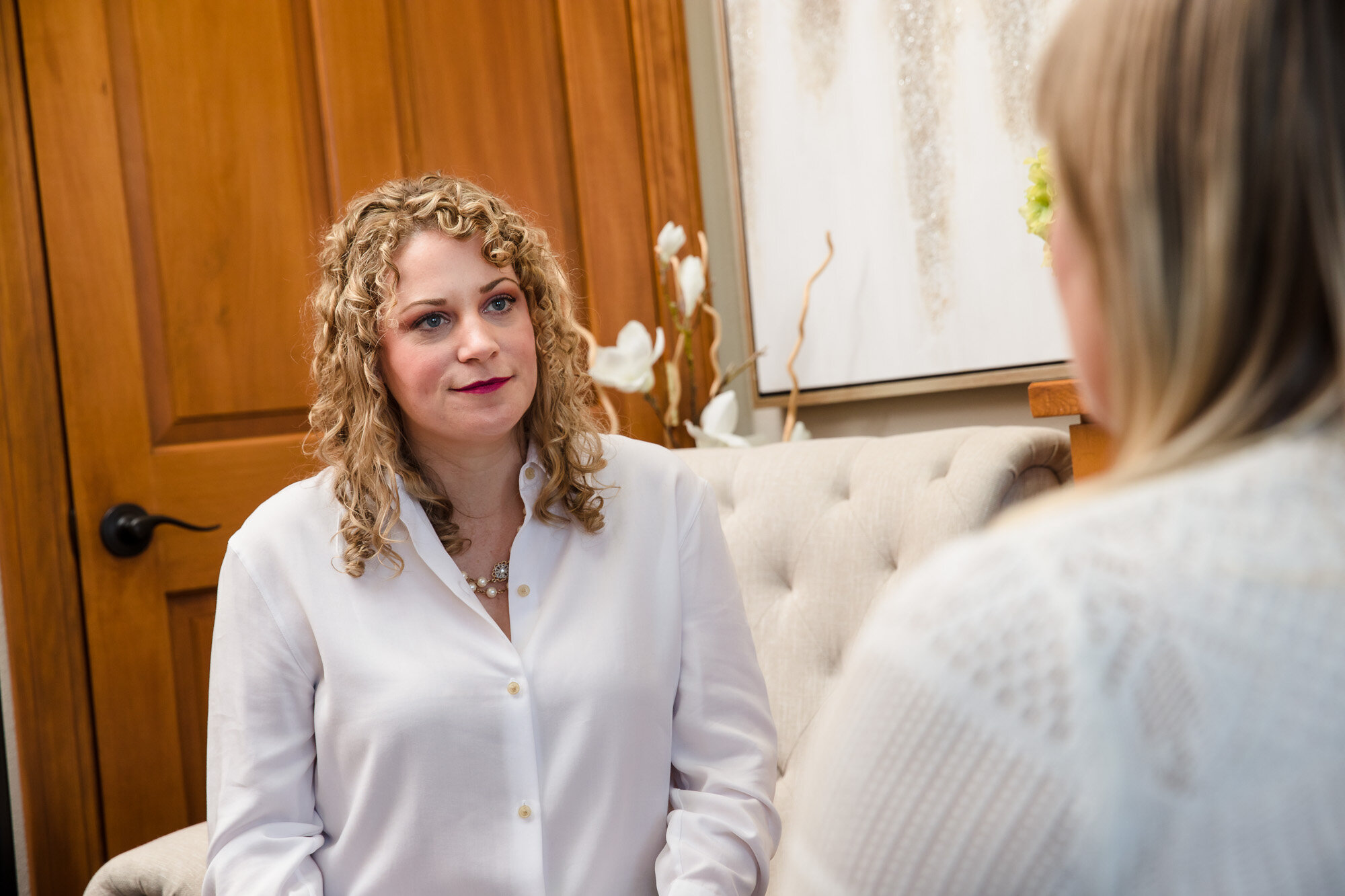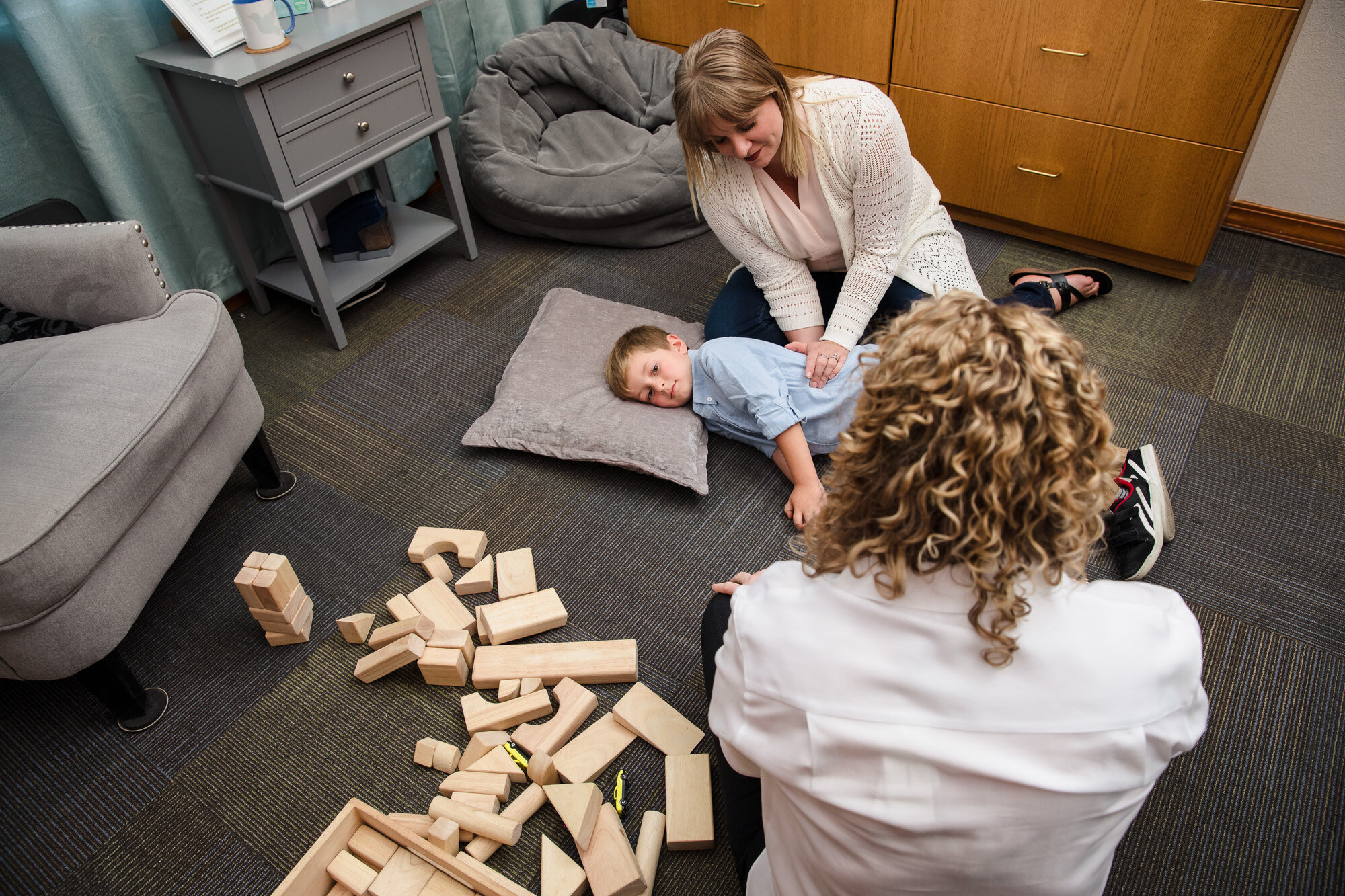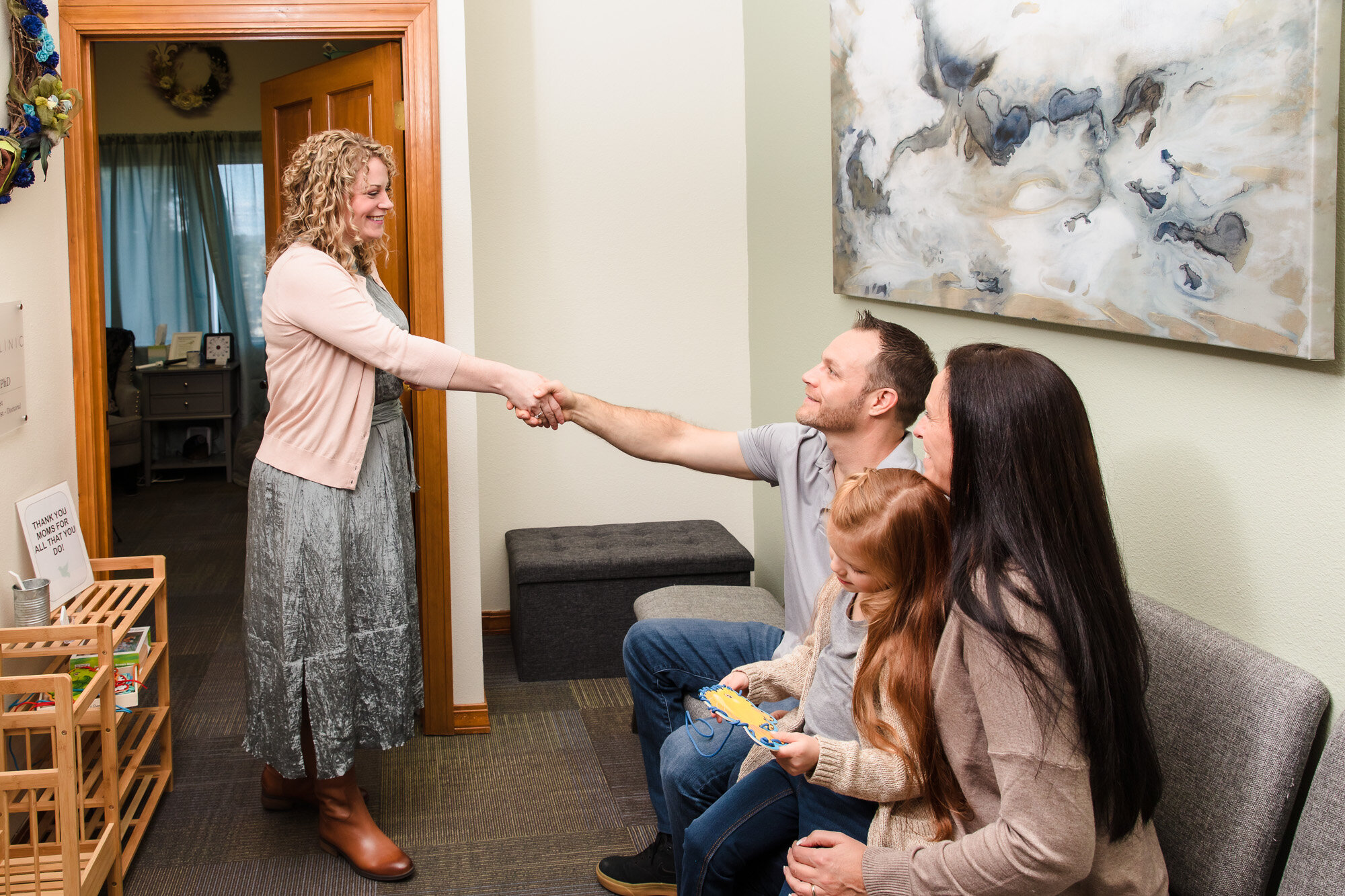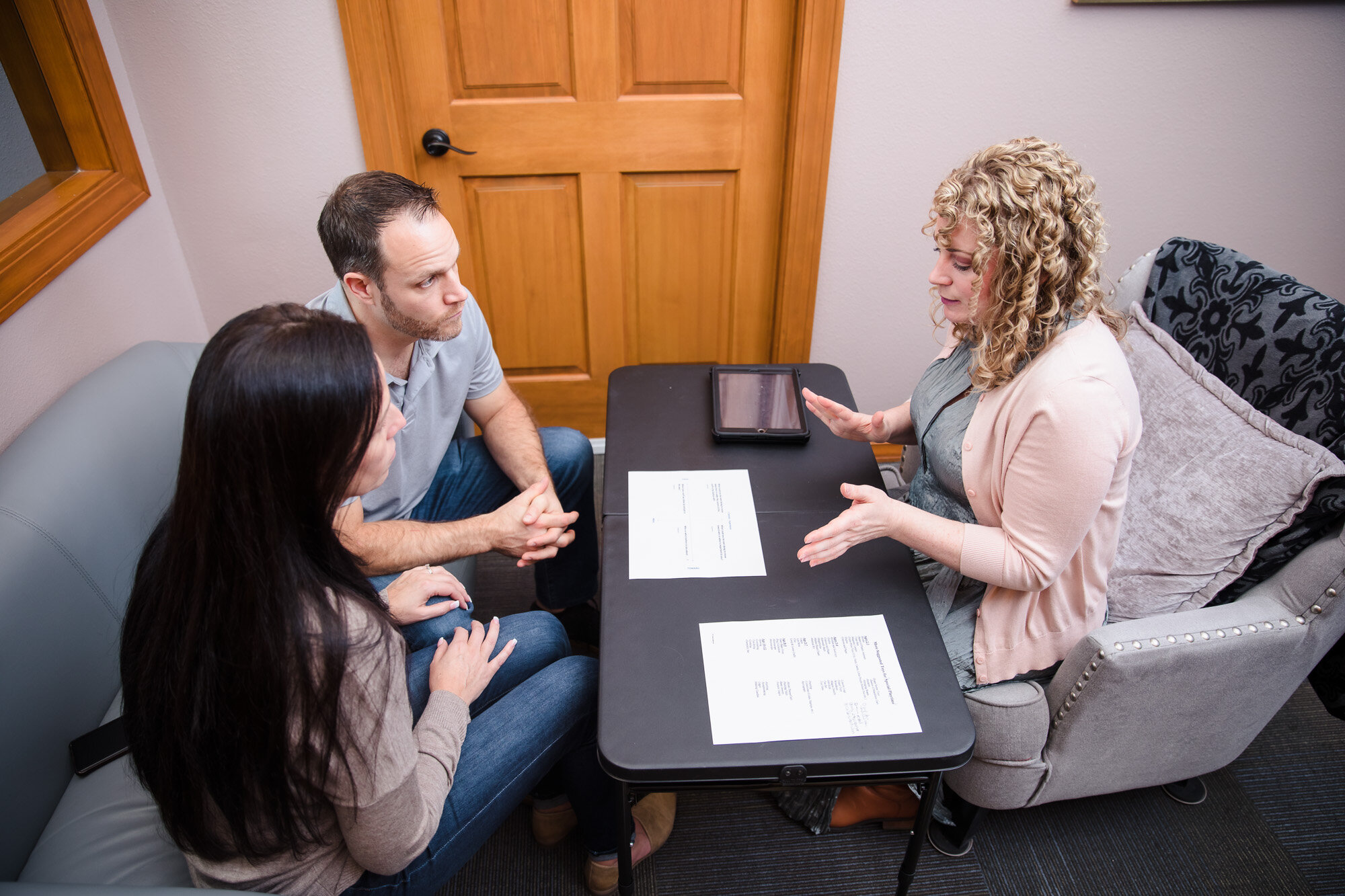I'm chatting with Michelle Winebender, a Registered Dietitian and Nutritionist for over 25 years (and a good friend of mine). We chat about how to create healthy eating habits in young children so that they grow up to have a good relationship with food. Michelle helps with the super common questions I get "Is my kid eating enough?" and "Will my child get a nutrient deficit if I can't get them to eat more variety?"
Read MoreWhat's Really in Washington State's New Sex Ed Bill? | A Conversation on Sex Health Education
Dr. Blevins interviews Laurie Dils, Program Supervisor for Sexual Health Education at the Office of Superintendent of Public Instruction (OSPI) regarding Bill 5395, the new sex ed bill recently signed into law by Governor Inslee. The bill is currently on referendum fall 2020 for public vote.
Ms. Dils and Dr. Blevins talk through the intention, historical context, and outline of the bill, especially for the kindergarten through third grade social-emotional requirements and the fourth and fifth grade puberty requirements. Ms. Dils also addresses some misinformation on social media about the bill that is prominent on social media.
For parents and educators outside of Washington, this is a good conversation about sex ed generally and how schools play a role and think through the process of helping students through this part of development.
Read MoreFlexible home learning schedule | How to Keep kids engaged
We're taking a break from expert chats today so I can bring you information that I believe is awesome and super helpful to creating a learning-at-home schedule that benefits your child and you.
I'll go into the one big secret that teachers have been doing in Finland's schools for a while now. It helps increase attention and productivity in kids, promotes better mood, and is associated with higher achievement scores and better brain development.
Read MoreTreating Dyslexia | Expert Interview with Casey Harrison from The Dyslexia Classroom
Dyslexia is the topic for this week! This is also known as a Specific Learning Disorder/disability where the deficits are in basic reading skills, namely phonological processing.
Casey Harrison, an expert dyslexia specialist, will go into much greater detail about the ins-and-outs of what this means and other terms you may have heard used with dyslexia. Casey is an internationally sought after dyslexia treatment expert with over 25 years of experience in education.
We discuss what you should look for in a reading specialist if your child needs support and what a good therapeutic reading program entails. We also talk about learning to read more generally, so if your child is a bit younger and you are wondering about the approach to take, this is a great video to watch.
Casey works with children …more
Read MoreYoung Family Estate Planning
Today's video is the second in a three-video series on supporting your child in the financial domain. A couple of week's ago I addressed college (and other after-high-school pursuits) planning. In a few weeks I'll be addressing growing financial skills through intentional parent-led teaching by interviewing Thomas Corley, an award-winning author.
Today I am chatting with Randi Johnson of Lilac City Law about young family estate planning. Estate planning is putting in writing (so everyone is clear) your wishes for your children in the unfortunate event of your and their other parent's passing. We will discuss estate planning for typically developing children and the concerns involved when raising a child with special needs.
Specifically, we'll look at considering power of attorney versus guardianship when your child becomes an adult, choosing a guardian and the different types of guardians, examining what a trust is and how it can provide
Read MoreWriting IEP Goals that Work
Today I'm continuing my series of expert chats with Brandie Rosen, a 25-year veteran of special education and teacher training. She's worked on over 5,000 IEPs! She shares with us valuable insight into writing good IEP goals.
IEP goals are the meat of any special education child's services. They provide the road map for what the school, his teachers, and the child will be accomplishing as part of the special education programming for the next calendar year. Brandie helps me to understand how this individualized map fits in with the general education curriculum and how it pulls services, like speech and language, to support meeting the IEP goals. We also dive into Brandie's work in training teachers, specifically with addressing anxiety in students. Brandie provides a framework for how she promotes a collaborative, expertise driven working style so that teachers can do their best work with students while students are getting all of their needs met.
Have a great day!
Dr. Blevins
Resources
Brandie's parent website: https://brandierosenconsulting.com/
Brandie's teacher website: http://learn2teachwithbrandie.com/
Here is a link to Brandie's resource page for parents; lots of good IEP content! :) https://brandierosenconsulting.com/faq-and-resources/
Read MoreCouple's Counseling and How It Can Help with Parenting
Dr. Blevins is continuing her expert chats this week with Billie Tyler, MS, LMFT out of Spokane, WA who specializes in relationship counseling. She uses the Gottman approach, Emotion Focused Therapy, and Solution Focused Therapy as her orientations. Our conversation includes an overview of what couple's therapy is and the way it can help parents to reach their parenting goals. They discuss how relationship therapy may come on the radar for parents, what some common difficulties are that Billie sees, and the benefits of establishing healthy communication early in any relationship. You can learn more about Billie Tyler, MS, LMFT at https://billietylertherapy.com.
Read MoreFunding College: Info for special needs and traditional students
Dr. Blevins chats with Katrina Roy and Peter Tassoni, both employed with the state of Washington, about considerations for college financial planning. Planning for both special needs and typically developing children are covered.
Download the presentation here: https://teachdirections.enildaclinic.com/funding-college
Questions covered include:
1. What might be additional factors to consider, financial opportunities, or hurdles to overcome when planning for college if a child has special needs?
2. What if your child is considered disabled and won’t get a traditional college credential. Is funding available for them?
3. For typically developing kids, what’s the ideal planning path?
4. For typically developing kids, if I haven’t planned and my kid is now in high school, what should I be doing to best prepare for a good financial situation with them in college?
5. What is my child’s responsibility (at various ages) that I can encourage them to do to contribute to their college financial health?
Read MoreBook Review: a kids book about racism by Jelani Memory
In honor of our society's awakening to social injustice and a deeper need to hear from more diverse voices, today's learning video is a book review of a kids book about racism by Jelani Memory. The book does a great job of providing structure to help guide parents in a conversation about racism with their children without giving explicit examples, which might be age-inappropriate for some kids. This allows parents to tailor their own examples to a child's maturity level, making the book one you can come back to time and again as your child gets older and their understanding of the world grows.
I am having a give away for two copies of a kids book about racism. You may enter the giveaway by responding to this email (FrontDesk@EnildaClinic.com) with learning video topics that are of interest to you! The giveaway will end August 11, 2020.
Relaxing Your Body | Managing Stress
If you're like me, you've been a bit more stressed recently. It's hard not to be. On top of normal everyday life stress, we're having a pandemic and a long awaited social awakening to systemic racism.
It's hard to be present and feel 100% everyday. So, I wanted to share how I'm taking care of myself. I'm specifically going to focus on mindfulness and body awareness. They go hand-in-hand, of course. And if you feel this is a little woo woo of a topic, just hold on through the next paragraph...
Psychiatrist Bessel Van Der Kolk, M.D. wrote a New York Times Best Seller on trauma and the body, The Body Keeps the Score, that went into amazing detail about how our bodies hold the scars of emotional, verbal, and systemic trauma (in addition to physical trauma of course) through dysregulation of our fight or flight or freeze response. In the short term this can lead to poor sleep, digestive distress, and irritability. But, the long term consequences can be devastating. The ACEs Study found that chronic diseases, like hypertension, alcoholism, depression, drug abuse, eating disorders, obesity, and other poor future behaviors and outcomes, like high-risk sexual behaviors, smoking, and suicide and more likely to occur in adulthood with increased risk factors in childhood, including multiple forms of trauma. See ACEs Info here.
When I work with a child, I always consider …
Restrictive and Repetitive Behaviors in High Functioning ASD
This week's learning video discusses restrictive and repetitive behaviors (RRBs) as they are sometimes seen in high functioning (HFA) individuals with Autism Spectrum Disorder (ASD).
I often see, and many psychologists describe, that children and adults who have reached a higher level of adaptive functioning, or higher cognitive (thinking) skills level, will present differently than a moderately or low functioning person with ASD. First I'll provide some context for how I most often have seen HFA in my private practice among young children and when evaluating a range of ages up through adulthood.
A person with HFA can better compensate because …
Building Routines and Habits During Summer
It's finally summer!! The stress of homeschooling is over. The governor in Washington just announced that schools will be taking students in for a physical open in the fall. Ahhhh!!!
You deserve a break! You've worked hard doing multiple jobs for 3 months straight. Go ahead and plan that getaway!!
Today's learning topic is for when you come back rejuvenated from break and the kids are settling into their summer routine. Just before they start in with the "I'm bored" statements. Today's topic is about reducing kid frustration and increasing their cooperativeness through environmental arrangement.
Specifically, environmental arrangement is …
Last Week of School | Reflection Activity
You did it!!!
I hope your summer is filled with sun, warmth, and fun. You deserve it!
Before you get started, I want to encourage you to take a few minutes to reflect with your child on how you two (three, four...) worked together these last few months. I have a fun, coloring activity for you to help!
Why?! Because you've stretched yourself and grown so much. It's worth seeing how you've filled those little spaces and accommodated a whole new career (being a teacher!) while still doing all the many other duties of being a parent. I imagine your patience, skill in organizing and prioritizing, and communication have grown. I work with many perfectionistic parents... how did that attribute take a hit these last few months? Are you way more flexible now?
It's important to celebrate your own growth, and to really recognize the skills and resources you used to pull off these last few months. It's important that your child recognize it in themselves and you too. I bet they learned some things about how their brain learns. Many children I know have learned they need to get up and move more than they ever did at school. And they learn better because of it. Did your child learn how to manage their time and to interrupt you less? Maybe that's something they're still working on?? Or, maybe they learned that Mommy does really important things at her job. Or that she helps little brother too, so it's important to wait.
Too often I see parents rush into the next phase of life right after the last hurdle. This creates a sense of always trying to tread water. Pausing for reflection on our strengths and how we've grown helps us to mark the time, joy, achievement, giving us a sense of calm and satisfaction. Additionally this school year, many school celebrations have been cancelled or disrupted. So, yes, you are so key and important to helping your child with this step.
Watch the video for detailed instructions on the coloring activity, and Celebrate!!
Warmly,
Dr. Blevins
Enilda Clinic Supports Black Community's Right to Safety, Liberty, and the Pursuit of Happiness
Last week was hard for sure. The videos that surfaced revealing what the black community has known for so long, that racial prejudice leads to their injury and death more often than white people, was disturbing and eye-opening. My heart aches for the black community and the families that have been touched by a lost loved one. I feel compelled to take a break from my usual learning videos and speak up about our nationwide community focus on the racism pandemic.
I abhor what I’ve witnessed in those videos by white perpetrators. I know that my grief and trauma from watching the videos is nothing compared to what my black neighbors experience every day. I don’t want to be another white person enjoying my privilege and not understanding how I perpetuate incidents like those in the viral videos from last week.
Thus, I decided I want to speak out today about my strong support of the black community. I immediately last week wanted to create a learning video that could help white families and parents, who I know deeply want to take action themselves and help their children to process what’s happening and/or to grow with greater empathy, compassion, and awareness of their privilege. We want to DO something. I also want to support black families in coping with their trauma; the emotional labor of racism is exhausting.
I quickly realized that I would need to call on my professional peers to create such an impactful resource if it was going to be meaningful to a broad range of families. I also recognize that my lived experience with racism represents only a small segment of what the vast majority of families experience. While I could look up statistics and read those to you, I think you really want to understand how to have meaningful conversations with your children. So, I’ve been reaching out to numerous organizations, seeking collaborators, and reviewing resources. It will likely take me a few more days to put together a learning video or two that I feel adequately addresses this issue from a research-based perspective and also from a broad perspective of lived experiences. This is a complex topic, and I recognize that I won’t get the answers right all the time. And maybe the answers will steadily change and grow as we learn.
To get to my purpose for today’s video, I didn’t want to delay in letting you know my support for the equal treatment of individuals. For the right to life, liberty, and equity among individuals regardless of their race. And the fact that I believe black people when they say that they have unfairly been hurt and killed for generations. I can see it. For the BIPOC watching this learning video, I see you. I believe that silence at this time is a clear wrong answer. And I did not want any delay to be misconstrued as silence.
As a scientist-practitioner I find that I am walking a balance between finding the "perfect" research-based answer and showing "perfect" immediate compassion. Using ACT, I realize that my own behavior is a reflection of my lifelong anxiety around this topic. And I want to be open and share with you all that I know that it’s hard to have these conversations. I know I will make mistakes, and I want to invite any and everyone to submit feedback to me to support me in my continued learning on this topic, as well as other families. I support parents of a variety of different family types, teachers, administrators from within the court system, and providers from a variety of different healthcare professions, and I want Enilda Clinic to be a place of safety to explore, learn, and heal. If you have an opinion on this topic that you think would be important for the audience of the Enilda Clinic learning videos, I encourage you to send me an email at frontdesk@EnildaClinic.com. I look forward to supporting and learning with you all as we ally with our black community.
Warmly,
Dr. Blevins
Happy Memorial Day! | How to Reflect on a Lifetime of Values
Happy Memorial Day!
I wanted to spend some time with you today reflecting on values. Values inherently lead us to think about the past and future. Many military women and men have died in the past to give us this future. What is pursuing happiness if not pursuing your values? Through my practice of Acceptance and Commitment Therapy (ACT), I more and more become aware of my pursuit of happiness, my freedom to become the person I might most aspire to be.
And let's be honest... I become more aware of my drive to be who I intentionally set out to be because I'm older and wiser. Every day. Tomorrow I may shift my aim just a bit because yet again I'll be older and wiser. I'll learn from my past because of my commitment to these values.
I recently had a conversation with my sister about this very topic. She told me that she never thinks about how she is intentionally developing herself or creating her pathway across life. She just notices things about herself, and simply accepts that she is who she is. As a psychologist, that's soooo different from me. I have to admit she has great self-esteem.
I notice through my training, I've become aware of the small flinches of unhelpful thoughts that distract me, the uncomfortable feelings that can paralyze me, or the small habits that can become a lifetime of inaction. I would say I have "realistic" self-esteem. My sister is very happy, and so am I. She is very present-moment centered, whereas I try to see the thread connecting myself from the past, to the present, to the future.
ACT is said as the word, to mean "doing." Today's video takes you through a brief exercise that allows you to experience the future you tied by a thread to today's you. By finding what really stands out as important to you across a lifetime, you find your values.
An interesting feature of ACT, and what I really appreciate in my sister, is the ability to give nonjudgmental acceptance to present-moment thoughts and feelings, even when they're uncomfortable. If you do the exercise and you find you're out of alignment with a cherished value, it may be uncomfortable. Just like my sister, accepting the uncomfortable feelings brings a sense of accepting who you are in totality.
What's most interesting about ACT, is if you can see the invisible thread from who you are now to the future you that you cherish, you'll know exactly how you'll want to act to get there. It's like your own personal map for life.
In sum, the acceptance part and the commitment part of act are both important. We're living beings moving along on a journey. I hope you enjoy this brief educational exercise. It's designed to help you understand what ACT is. If you want to learn more, you can establish services with an ACT provider in your state.
Warmly,
Dr. Blevins
Children's Language: An Overview of IQ and Adaptive Skills
Today's video hits on a common theme of concerns I get from parents of young children: language.
Young children can have problem behavior for a variety of reasons, but a common one is poor language development. It is always something I assess when I have a child (of any age) come in for evaluation.
The reason is that poor language skills lead kids to
1) misunderstand what has happened (leading to perceptions of lying),
2) misunderstand what they're told to do (leading to poor compliance),
3) poor articulation (leading to frustration and acting out), and
4) poor expressive productivity (leading to lower self-advocacy skills). These are just a few of the ways language can impact a child.
Every child is unique, and a comprehensive evaluation that includes your child's pediatrician's input and a speech-language pathologist's assessment is the best course to figure out what's going on and how to support your little one.
While language may be one root cause of behavior problems, it is one of many treatment approaches. We can provide interventions beyond increasing language. Other goals include emotion regulation, recognizing cues that signal the child's own needs, and changing stressful environmental situations to be more developmentally helpful.
Warm regards,
Dr. Blevins
Things on My Mind | Therapy for Kids
In today's video I am answering some of the questions I get from time to time from parents. I'm also chatting about some of the things that I find there to be confusion about regarding this weird time of stay-at-home orders.
The big take away is that there is still behavioral health support available to you, your child, and family. Just reach out to your preferred provider or PCP to figure out exactly what kind of services you may need and how to most safely access those services.
I, and many of my colleagues, have made note of the increased stress that parents and kids are experiencing recently. And daily stress can take it's toll.
You and your family deserve to have support and tools to manage that stress as best as you can. Even if you wouldn't say it's a "problem," you can still pick up some tools to feel better equipped with the day-to-day grind that is so hard for so many people right now. Whether you want a one- or two-session consult or traditional therapy that leads to big transformation of a more prominent difficulty, the behavioral health workforce is up and running!
I'm still feeling so inspired by the compassion that our world is showing to each other during the pandemic. Remember that self-compassion and refueling your tank will allow you to continuing being the rock star that you are!
Warmly,
Dr. Blevins
Grief in Young Children
I've been wanting to get to today's topic for a bit now. Given the pandemic, I've felt that grief (unfortunately) is a timely topic for families these days. Even if your family isn't touched by grief due to the pandemic, it doesn't hurt to be aware of how grief affects children. It's good info to sock away if ever, God forbid, you need to know it.
A disclaimer about the info in today's video: it reflects my review of the literature, which focuses on children's grief of close family members. If your child experiences grief of a more distant family member or friend, watches your personal grief of a lost one, or experienced a related loss (like the death of a pet) they may experience different or varied signs of grief from what I discuss in this video. This video does not go into aberrant or complex reactions to grief. If you ever have concerns, please contact your child's pediatrician.
Grief is a healthy part of the human experience. It tells us that we cared for and loved the lost one. Young children experience grief too because they love too. However, they have less developed language skills, more concrete thinking capacities, and learn how to understand experiences from watching those around them. This video discusses how that makes children's grief look different than adults.
If you're going through grief, this video may be hard to watch. I encourage you to skip it if you need to, watch it with a supportive person, or to seek your own supportive professional to interpret how you can best take care of yourself and any young children who may be grieving too.
Take care,
Dr. Blevins
Happy Mother's Day! - Pushing Past Emotional Blocks
Dr. Blevins discusses how ACT, Acceptance and Commitment Therapy, describes emotional blocks and supports individuals with pushing through them. She uses a personal example to help illustrate this learning topic and to support moms this Mother's Day as they might be working through heighten stressed due to stay home orders across the country. Emotional blocks can be when we're experiencing a block from our values and have negative feelings as a result.
Read MoreNew Sex Education Laws in WA State - Review of K-3
Dr. Blevins discusses the new sex education requirements in Washington state for kindergarten through third grades. She focuses on the new requirements and how this relates to what we know about human development in regards to healthy relationships. She also provides information to support parents in taking charge of their children's sex education at home, providing information about why it is important, a book to help guide the conversation, and how the state's new standards fit in.
Read More





